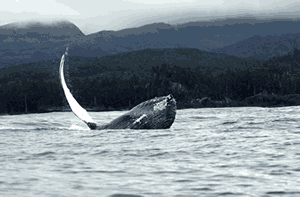 Common Name:
Common Name:
Humpback whale
Scientific Name:
Megaptera novaeangliae
Body size:
adult female 15 m
adult male 13.5 m
newborn calf 4.2 m
weight 30,000 kg to 48,000 kg width of adult fluke: 4.6 m
length of adult flipper: 4 m
Life expectancy:
Unconfirmed average 40-50 years
maximum possibly up to 80 years
Behaviour (vocal):
Males sing elaborate structured songs on the breeding grounds. In areas were group feeding is observed (e.g. Southeast Alaska) it is often accompanied by stereotyped feeding calls
Physical Characteristics:
Black or dark grey except for variable white patches on the underside of the body, flippers and tail flukesvery long flippers (the longest of all cetaceans) a small dorsal fin located on a humpbumps (tubercles) on their head, jaw and flippers, individuals can be identified from fluke markings, allowing them to be studied by scientists
Behaviour:
Very energetic and show spectacular breaching behavior
Habitat/distribution:
Humpback whales spend spring, summer and autumn on feeding grounds in temperate or high latitude waters. In the winter months, they travel to lower latitudes where the water is warmer and where they mate and give birth
Distribution:
One of the longest annual migrations of any mammal worldwide distribution with two stocks in the North Atlantic Ocean and two stocks in the North Pacific Ocean. The western North Atlantic holds the healthiest population of humpbacks
Diet:
Tiny shrimp-like crustaceans called euphausiids (you-FOH-sids) known as krill schooling fish such as herring and sand lance
Foraging Behavior:
Filter feeders-move water through their baleen plates to capture preymay lunge feed or entrap prey using “bubble nets”
Reproduction:
Humpback whales reach sexual maturity at approximately five years of agegestation period is roughly 11 to 12 monthscalves nurse for around 10 to 12 months and then leave their motheradult females typically give birth every two to three years to a single calf
Conservation status:
Conservation status Humpback whale (Atlantic): Not at Risk Humpback whale (Pacific): Special Concern
